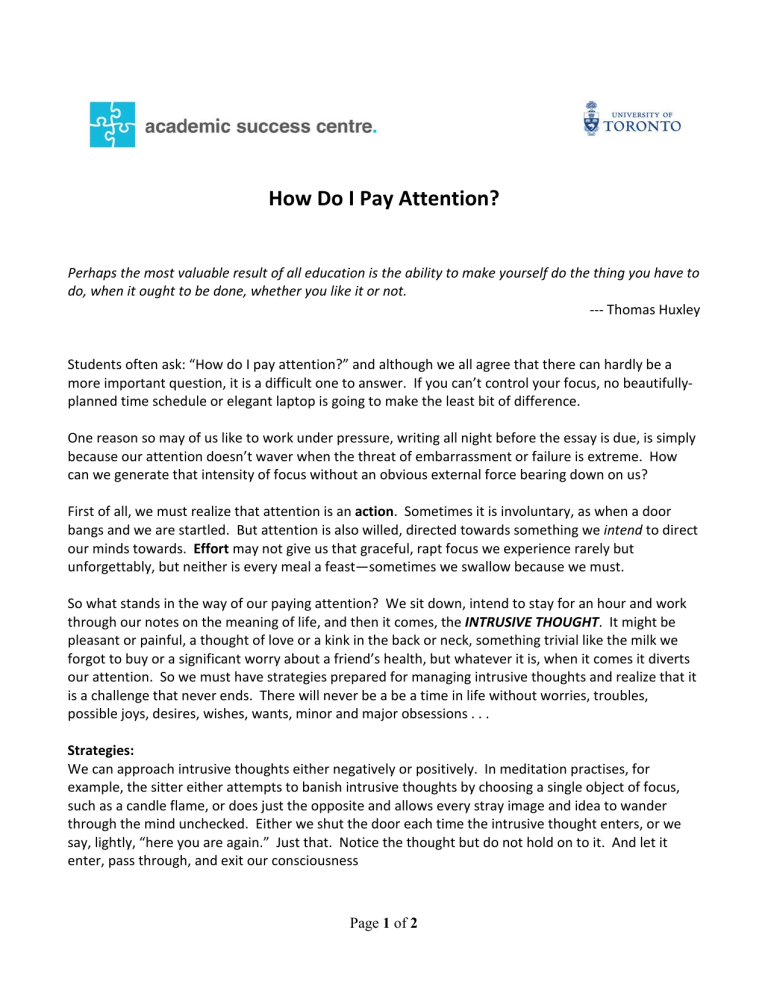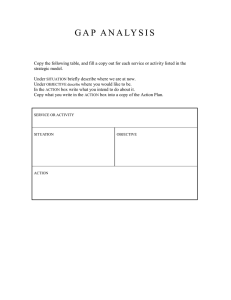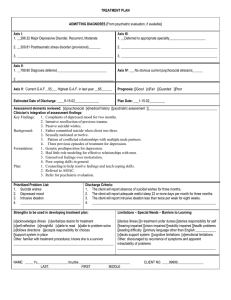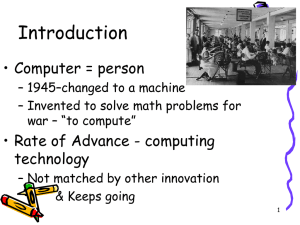How Do I Pay Attention? - Student Life

How Do I Pay Attention?
Perhaps the most valuable result of all education is the ability to make yourself do the thing you have to do, when it ought to be done, whether you like it or not.
--- Thomas Huxley
Students often ask: “How do I pay attention?” and although we all agree that there can hardly be a more important question, it is a difficult one to answer. If you can’t control your focus, no beautifullyplanned time schedule or elegant laptop is going to make the least bit of difference.
One reason so may of us like to work under pressure, writing all night before the essay is due, is simply because our attention doesn’t waver when the threat of embarrassment or failure is extreme. How can we generate that intensity of focus without an obvious external force bearing down on us?
First of all, we must realize that attention is an action . Sometimes it is involuntary, as when a door bangs and we are startled. But attention is also willed, directed towards something we intend to direct our minds towards. Effort may not give us that graceful, rapt focus we experience rarely but unforgettably, but neither is every meal a feast—sometimes we swallow because we must.
So what stands in the way of our paying attention? We sit down, intend to stay for an hour and work through our notes on the meaning of life, and then it comes, the INTRUSIVE THOUGHT. It might be pleasant or painful, a thought of love or a kink in the back or neck, something trivial like the milk we forgot to buy or a significant worry about a friend’s health, but whatever it is, when it comes it diverts our attention. So we must have strategies prepared for managing intrusive thoughts and realize that it is a challenge that never ends. There will never be a be a time in life without worries, troubles, possible joys, desires, wishes, wants, minor and major obsessions . . .
Strategies:
We can approach intrusive thoughts either negatively or positively. In meditation practises, for example, the sitter either attempts to banish intrusive thoughts by choosing a single object of focus, such as a candle flame, or does just the opposite and allows every stray image and idea to wander through the mind unchecked. Either we shut the door each time the intrusive thought enters, or we say, lightly, “here you are again.” Just that. Notice the thought but do not hold on to it. And let it enter, pass through, and exit our consciousness
Page 1 of 2
Remember:
It is natural for the mind to interrupt itself every two or three seconds. If it didn’t, our natural predators would have finished us off long ago.
Prescription for Focusing
• Minimize external distractions. You know what they are.
• Minimize internal distractions like fatigue, hunger, restlessness from lack of exercise, discomfort from eating unhealthy food (you know what that is, too!)
• Decide to work in short study-blocks of 20 to 30 minutes only.
• Spend the first 20 minutes planning the content of each study-block. Organise your study or writing time by means of questions that you will answer in the allotted minutes. The mind likes questions because it is a natural detective. The keyword or general topic, on the other hand, will naturally put you to sleep.
• Keep scrap paper beside you and jot down every stray interruptive thought or worry. That way, you can deal with them later. Decide to set aside “worry time” and maybe you will learn to procrastinate in a useful direction.
• Believe that attention is something you can improve with practise. Although some temperaments find it easier than others, all of us can increase the intensity of our focus and the length of time we can stay with a task.
The art of being wise is the art of knowing what to overlook.
--- William James
Use the no-room principle: Imagine that the pathways of your mind are completely filled with thoughts about the subject in front of you. Then there will be no room for extraneous thoughts, and they will be turned away.
-- Walter Paul, How to Study in College
Originally prepared by Dr. Gail Noble, Learning Skills Counsellor
Academic Success Centre, University of Toronto.
Page 2 of 2


